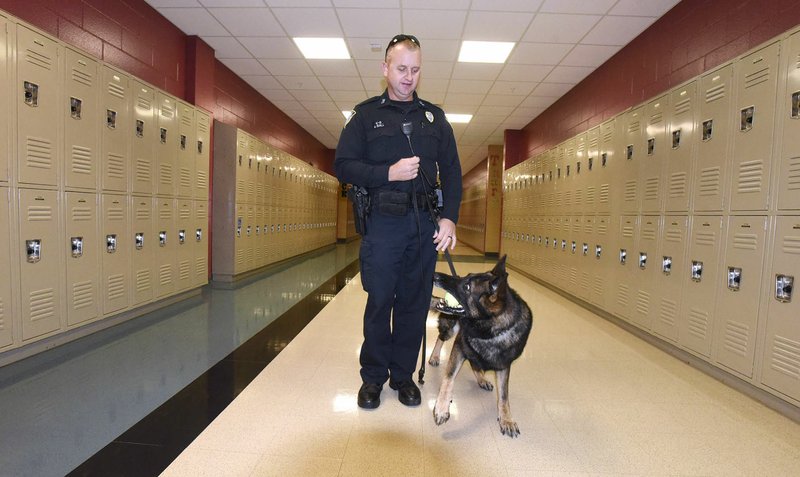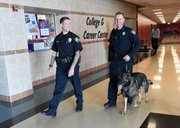BENTONVILLE -- The School District is partnering with the U.S. Department of Homeland Security to proactively combat illicit activity on its campuses. The "If You See Something, Say Something" campaign brings additional patrols by police and a new tip line for students to report suspicious or potentially dangerous activity.
"Our world is one in which everyone, including our students, must be vigilant. We want them to feel empowered to speak up when they see or hear something concerning," Superintendent Debbie Jones said in a district news release.
Suspicious activity
Suspicious activity, according to the U.S. Department of Homeland Security, is any behavior that could indicate terrorism or terrorism-related crime. This includes, but is not limited to:
• Unusual items or situations: A vehicle is parked in an odd location, a package/luggage is unattended, a window/door is open that is usually closed, or other out-of-the-ordinary situations occur.
• Eliciting information: A person questions individuals at a level beyond curiosity about a building’s purpose, operations, security procedures and/or personnel, shift changes, etc.
• Observation/surveillance: Someone pays unusual attention to facilities or buildings beyond a casual or professional interest. This includes extended loitering without explanation (particularly in concealed locations); unusual, repeated, and/or prolonged observation of a building (e.g., with binoculars or video camera); taking notes or measurements; counting paces; sketching floor plans, etc.
Source: U.S. Department of Homeland Security
The district, in collaboration with the Bentonville and Centerton police departments, is implementing random patrols using police dogs at its two high schools and three junior high schools. The department's dogs are trained to detect heroin, cocaine, methamphetamine and marijuana.
"We're going to do it at least once a month. It could be four times a month. We're not going to announce when or where," said Steve Vera, a Bentonville police officer who was hired Monday by the School Board as the district's safety and security coordinator.
Bentonville police officer Andy Ball and his dog, Tyson, visited Bentonville High School on Wednesday morning. Tyson, an 8-year-old Czech German shepherd, barked and whined as they strolled through the halls along with student resource officers Kevin Albert and John Loncarevic.
"He's very vocal," Ball said of Tyson, who didn't pick up on any unusual scents in the school.
Implementing the random police dog patrols shouldn't be interpreted as a sign the district has a drug problem, Loncarevic said.
"We're a school of 3,300 kids, so have we found drugs in the school? Yes. Do I think we have a drug problem? No," Loncarevic said. "But I think just trying to stay ahead of it, let the kids know that we are actively looking, will hopefully prevent them from bringing it to school."
Vera echoed Loncarevic's remarks.
"Every high school in America has drug usage," Vera said. "There are drug issues, but Bentonville is no different than any of the other schools."
Vera has been a police officer for 33 years, including nearly 18 years with the Bentonville police. He was Bentonville High School's student resource officer for about 16 years.
In his new position, Vera will serve as a liaison between the district and emergency responders and will do staff training and campus investigations, according to a district news release.
"The experience Steve brings to Bentonville Schools is second to none," Jones said. "He possesses the wisdom, leadership and poise to help us better protect our students."
Vera fills a position formerly held by Vic England, who retired from the district this year as energy manager. Part of Vera's job will be to monitor the district's energy consumption. He'll also oversee updates of school crisis plans and make sure lockdown drills are performed and threat assessments are done at each building, he said.
Vera also will monitor the new confidential tip line, which students may reach at (479) 367-8080.
Tip line callers are greeted by the following recorded message: "You've called the tip line for Bentonville Schools. If this is an emergency, hang up and dial 911. Your call is confidential. Please tell us where the incident took place or may take place and the names of anyone involved."
"It's just a tool to allow kids to use if they have any kind of information," Vera said. "Sometimes kids are either embarrassed or afraid to go to an adult, even their parents. They may be afraid to be seen as snitches."
There are no significant costs to the district associated with the measures being implemented. The police departments can absorb the extra patrols with their current manpower, Wright said.
The "If You See Something, Say Something" campaign was originally implemented and trademarked by the New York City Metropolitan Transportation Authority and is licensed to the U.S. Department of Homeland Security as a national campaign, according to the department's website.
The department launched the campaign in 2010 with the goal of training state and local law enforcement to recognize behaviors and indicators of terrorism and terrorism-related crime, the website states.
NW News on 10/26/2017



